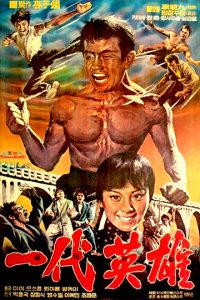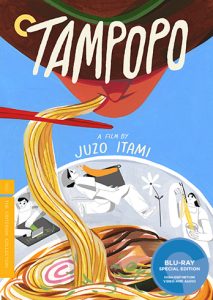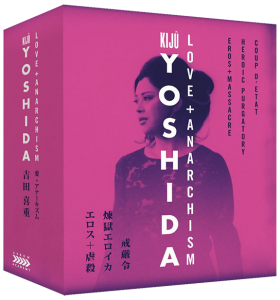cityonfire.com | Movie News & Developments |
- Tiger of Northland (1976) Review
- The Criterion Collection cooks up Juzo Itami’s ‘Tampopo’
- Arrow Video shoots ‘Kiju Yoshida: Love + Anarchism’ to the U.S.
| Tiger of Northland (1976) Review Posted: 18 Jan 2017 01:00 AM PST Director: Peng Chang-Kuei By Paul Bramhall After Bruce Lee's untimely death in 1973, the production company that Lee was signed to, Golden Harvest, scrambled around for a number of years afterwards, attempting to find a bankable replacement that could fill the shoes of their biggest star. While local talent like Jimmy Wang Yu and Angela Mao were pushed to the forefront, producer Raymond Chow also attempted to fill the void with a number of Taekwondo and Hapkido practitioners from Korea. While Lee himself had fought the likes of Whang In-shik (Way of the Dragon) and Ji Han-jae (Game of Death), in the years after his death fellow Koreans such as Byong Yu (The Association) and Jhoon Rhee (When Taekwondo Strikes) were also attempted to be billed as the next big stars. Unlike the local stars though, many of which came from either sporting or Peking Opera backgrounds, what made the Korean stars stand apart was that all were teachers of their arts, and for many the film industry simply wasn't their calling. Both Byong Yu and Jhoon Rhee made a single movie and returned to teaching, which they do to this day, as do most of the other Korean stars of the era. However despite the shortness of their time in-front of the camera, the impression they left was a memorable one, delivering a ferocity that made it easy to understand why they were considered as potentially the next big thing. With all learning their arts in the harsh years following the Korean War, the intensity that they brought to the screen was a different kind than their Chinese counterparts, with lethally fast kicks accompanied by thunderous growls usually coming as standard. Another such star was Park Jong-kuk, who debuted as the title character of Tiger of Northland, from 1976. The movie was a rare example of a genuine co-production between Hong Kong's Golden Harvest studio and Korea, and again was an example of Jong-kuk being lined up as a bankable leading man in the post-Bruce Lee Golden Harvest era. Filmed entirely on location in Korea, director and writer Peng Chang-Kuei looked to be evoking the same feel of a Bruce Lee movie, casting Maria Yi Yi, who had roles in both The Big Boss and Fist of Fury, as Jong-kuk's love interest, and hiring frequent Lee cinematographer Tadashi Nishimoto. For whatever reason, this would be the only time Chang-Kuei would direct and write a movie. Having previously worked as an assistant director on the 1971 Shaw Brothers productions The Swift Knight and Six Assassins, after Tiger of Northland he disappeared into obscurity. It would also be the only time for Jong-kuk to be billed as a lead. In the years following he'd go on to take supporting roles in the likes of The Legendary Strike, Iron Fisted Eagle's Claw, and Quick Step Mantis, however by the end of the 70's he was featuring in 100% Korean productions, usually as a supporting playing in Elton Chong kung fu comedies. If you're only going to headline one movie though, then Tiger of Northland is a more than worthy title to be proud of. Jong-kuk plays a Chinese freedom fighter that flees to Korea during the 1930's, similar to Jason Pai Piao's role in The Crush from 1972, in order to recruit more fighters to the resistance from both China and Korea. While he's hitching a ride on a train, he saves a family being harassed by a Japanese soldier, killing him in the process, which results in the Japanese forces in Korea attempting to hunt him down. That's essentially the story, it's about as much of a standard tale of Chinese/Korea vs Japan as you can get, however it sets the stage for Jong-kuk to step into the shoes of a kind of 1930's era Chen Zhen. In fairness, it's understandable to see why he was never going to be leading man material, with his performance being as wooden as they come. Frankly it would have been more convincing if Maria Yi Yi had fallen for one of the planks of wood that he kicks in half. However Chang-Kuei is mainly concerned with crafting a tale that has the cruel Japanese forces receiving their just desserts, and to that end, Jong-kuk delivered admirably. In many ways 1976 can be considered as that transitional period between when the basher style choreography, that dominated the first half of the decade, began to develop into a more intricate style of fluid and fast shapes based choreography. Sammo Hung was one of the action choreographers at the forefront of this change, and here is credited with the action alongside Tony Leung Siu-Hung and Richard Cheung Kuen (both of whom also have roles in the movie). Just one year later Sammo would make his directorial debut with The Iron Fisted Monk, heralding in the era of hard hitting fights, backed up with the innovative camera work that he'd become known for. In Tiger of Northland, the action strikes an appealing balance between the basher brutality and what was to come. Japanese soldiers aren't just punched off the screen here, they're kicked to the ground, mounted, and then punched repeatedly in the face until they flop into a lifeless slump. The production is also notable for being Siu-Hung's first gig at action directing. The younger brother of Bruce Leung, Siu-Hung has had a varied career, having sat in the director's chair for such Shaw Brothers productions as Thunderclap, through to HK/USA crossovers like Superfights and Bloodmoon, all of which he also choreographed. As an action choreographer he's one of the most underrated, having orchestrated the action for such personal favourites as Fistful of Talons and The Magic Crystal, so as an early look at his talents, Tiger of Northland should be of interest to any of his fans. As was also standard for the era, Sammo makes an appearance as a villain, here as a yellow robed Japanese bodyguard, paired with Shaw Brothers regular Anthony Lau as a facially scarred Japanese Karate teacher. The 2 vs. 1 is a standout, which takes place as part of the finale, and was most likely solely choreographed by Sammo, as the speed of the fight is significantly turned up a few notches from the previous confrontations. There's also another worthwhile 2 vs. 1, which has Jong-kuk facing off against a pair of action choreographers who are famous in their own right – Hsu Hsia, who directed the likes of Lion Vs. Lion and Kid from Kwangtung, and Chik Ngai-Hung, who choreographed the likes of The Loot and The Challenger. Here they play a pair of staff wielding Japanese guards, and their confrontation nicely segues into the one with Sammo and Lau. Tiger of the Northland is undeniably one of those movies for which you check in for the action, and to that end, the fights have a raw intensity to them that keeps you glued to the screen, with the camera showing a keen eye for capturing the power behind Jong-kuk's kicks and strikes. For fans of Korean martial arts cinema of the era, there are also plenty of familiar faces on display, such as Bang Su-il and Chang Il-shik, both of whom can be seen in the likes of Canton Viper and The Deadly Kick. Il-shik in particular is on duty here as the main villain of the piece, and the final fight is a suitably vicious affair, which makes the effort to crank things up by including throws and kicks that send the recipient flying through the air, landing an exaggerated distance away. The difference in choreography style from the rest of the movie makes the fight stand out for the right reasons, while never becoming over the top. Its cinema, and Chang-Kuei seems to understand that. While neither Jong-kuk or Chang-Kuei would go on to become familiar faces of the kung fu genre, and at the time Tiger of the Northland failed to give the world a new Bruce Lee, with the benefit of looking back over 40 years on, it stands up as a worthy entry in the kung-fu genre. With a combination of hard hitting action, some beautifully framed cinematography, and a suitably fitting score, if you're after a dose of mid-70's gritty Golden Harvest style action, then you've come to the right place. Paul Bramhall’s Rating: 7.5/10 |
| The Criterion Collection cooks up Juzo Itami’s ‘Tampopo’ Posted: 17 Jan 2017 07:45 PM PST The Criterion Collection announced today that it plans to bring Juzo Itami's Tampopo to DVD and Blu-ray on April 25, 2017. Starring Nobuko Miyamoto (A Taxing Woman), Tsutomu Yamazaki (Departures), Koji Yakusho (The World of Kanako), Rikiya Yasuoka (Stray Cat Rock: Sex Hunter), and Ken Watanabe (Godzilla), Tampopo is a surreal comedy favorite both in its native Japan and among international audiences. From Criterion: The tale of an eccentric band of culinary ronin who guide the widow of a noodle shop owner on her quest for the perfect recipe, this rapturous "ramen western" by Japanese director Juzo Itami is an entertaining, genre-bending adventure underpinned by a deft satire of the way social conventions distort the most natural of human urges, our appetites. Interspersing the efforts of Tampopo (Nobuko Miyamoto) and friends to make her café a success with the erotic exploits of a gastronome gangster and glimpses of food culture both high and low, the sweet, sexy, and surreal Tampopo is a lavishly inclusive paean to the sensual joys of nourishment, and one of the most mouthwatering examples of food on film ever made. Special Features:
Pre-order Tampopo from Amazon.com today! |
| Arrow Video shoots ‘Kiju Yoshida: Love + Anarchism’ to the U.S. Posted: 17 Jan 2017 12:15 PM PST Back in November 2015, Arrow Video released Kiju Yoshida: Love + Anarchism Blu-ray & DVD Boxed set in the UK, but now, the company is finally bringing the set to the U.S. for a April 11, 2017 release. The work of Kiju Yoshida is one of Japanese cinema’s obscure pleasures. A contemporary of Nagisa Oshima (Death by Hanging, In the Realm of the Senses) and Masahiro Shinoda (Pale Flower, Assassination), Yoshida started out as an assistant to Keisuke Kinoshita before making his directorial debut at age 27. In the decades that followed he produced more than 20 features and documentaries, yet each and every one has proven difficult to see in the English-speaking world. This collection brings together three works from the late sixties and early seventies, a loose trilogy united by their radical politics and an even more radical shooting style. Eros + Massacre, presented here in both its 169-minute theatrical version and the full-length 220-minute director’s cut, tells the parallel stories of early 20th-century anarchist (and free love advocate) Sakae Osugi and a pair of student activists. Their stories interact and intertwine, resulting in a complex, rewarding work that is arguably Yoshida’s masterpiece. Heroic Purgatory pushes the dazzling cinematic language of Eros + Massacre even further, presenting a bleak but dreamlike investigation into the political discourses taking place in early seventies Japan. Coup d’etat returns to the past for a biopic of Ikki Kita, the right-wing extremist who sought to overthrow the government in 1936. Yoshida considered the film to be the culmination of his work, promptly retiring from feature filmmaking following its completion. Limited Edition Blu-ray Contents:
Pre-order Kiju Yoshida: Love + Anarchism from Amazon.com today! |
| You are subscribed to email updates from cityonfire.com. To stop receiving these emails, you may unsubscribe now. | Email delivery powered by Google |
| Google Inc., 1600 Amphitheatre Parkway, Mountain View, CA 94043, United States | |




No comments:
Post a Comment